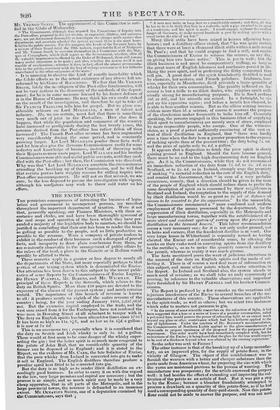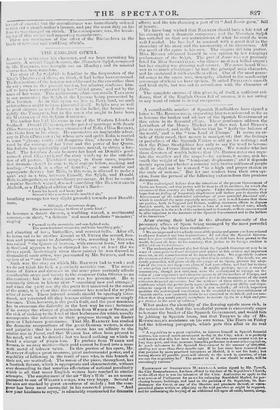THE EXCISE INQUIRY.
THE pernicious consequences of intrusting the business of legis- lation and government to incompetent persons, are manifest throughout the important department of taxation. Were it not that, generally speaking, our Finance Ministers, with their se- cretaries and clerks, are and have been thoroughly ignorant of the real scope and operation of the laws which they have per- suaded a majority of the legislative body to sanction, we should be justified in concluding that their aim has been to render the taxes as galling as possible to the people, and as little productive as possible to the revenue. Were a company of private traders to exhibit in the conduct of their business such a disregard of proved facts, and incapacity to draw plain conclusions from them, as are censtantly observable in the management of public affairs by the rulers of the land, a place in the Gazette or in Bedlam would speedily be allotted to them. These remarks apply in a greater or less degree to nearly all the departments of the State, but more especially perhaps to that portion of our taxing system which is denominated the Excise. Our attention has been drawn to this subject by the recent publi- cation of some Reports by the Commissioners of Excise Inquiry, Sir HENRY PARNELL, Mr. BERENS, and Mr. WICKHAM. The principal of these Reports is the Seventh, which relates to the duty on British Spirits. More than 450 pages are devoted to the exposure of the abuses of the present system ; and much remains untold. The importance of this branch of revenue is known to all : it produces nearly an eighth of the entire revenue of the country.; being, for the year eliding January 1834, 5,257,865/. net. But the extensive capital employed in the trade, and the vast sum raised from it for the Exchequer, have not rendered the Wise men in Downing Street at all reluctant to tamper with it. The duty on English spirits has been altered ten times since 1794 I It has been as high as 1 l. 81d., and as low as 3s. -1N. a gallon : it is now at 7s. 6d.
This is an enormous tax ; especially when it is considered that the duty on Scotch and Irish whisky is only 3s. 4d. a gallon. There would at first seem to be some danger of the whisky super- seding the gin ; but the latter spirit is so much more congenial to the palate of John Bull, that no considerable quantity of the former can be disposed of in England ; and it is stated in the Report, on the evidence of Mr. CARR, the late Solicitor of Excise, that the pure whisky from Ireland is converted into gin to make it sell in England. The English distillers therefore produce a peculiar spirit best fitted to be converted into gin.
But the duty is so high as to render illicit distillation an ex-
ceedingly good business. In order to carry it on with due regard to the law, very large premises and capital are necessary ; but the process is so simple, and so much spirit may be made by a very cheap apparatus, that in all parts of the Metropolis, and in the large provincial towns, the revenue is defrauded to an immense extent. Mr. OCTAVIUS SMITH, one of a deputation examined by the Conamissinners, says that- " A man may make (sr keep beer to a considerable extent ; and then, all that he has to do is to distil that beer in a teakettle, with a pipe attached to its spout as a condenser, and his spirit is made. I would engage, without the smallest danger of 44s-emery, to make several hundreds a year by makiug spirits with a vessel twice the site of my hat." Many illicit stills have been seized in houses adjoining beer. houses ; and a distillery-officer stated, that " he was quite certaio that there were at least a thousand illicit stills within a mile round St. Paul's ; and that he would engage to find a still, and enable the Commissioners of Excise to witness the seizure, on any day, on giving him two hours notice." This is pre:ty well ; but the illicit business is and must be comparatively trifling, as long as the great mass of English labourers and mechanics persist in dis- liking the pure spirit, and in preferring the filthy compound they call gin. A great deal of the spirit fraudulently distilled is useil by chemists, hat-makers, and French polishers. Irishmen, how- ever, especially in Manchester, distil privately a large quantity of whisky for their own consumption. The penalty inflicted on dis- covery is but a trifle to an illicit dealer, who supplies spirit suffi- ciestly strong for manufacturing purposes. Ile is fined perhaps 30/. or 40/., and his utensils are seized. IA a fortnight, he can put up his apparatus again ; and before a month has elapsed, he is able to bear another seizure. But as the officer seizing receives seldom more than 5/. a seizure, of course it answers the purpose of the clandestine maker frequently to bribe him off. Generally speaking, the persons engaged in this business (that of supplying illicit spirit to manufacturers) are merely men of straw, employed by more responsible people, who escape. One of the witnesses states, as a proof ti priori sufficiently convincing of the vast ex tent of illicit distillation in England, that " there was hardly ever a time when the duty bore a greater proportion to the expense of making spirits than at the present time; the duty being is. Gd. and the price of spirits only 9s. ad. a gallon."
It appears that a disposition to drink the pure spirit is slowly gaining ground in England. Should the taste become general, there must be an end to the high discriminating duty on English gin. As it is, the Commissioners, while they do not recommend an immediate reduction of the duty from is. Gd. to 3s. 4d. as in Scotland, or to 2s. 4d. as in Ireland, strongly urge the propriety of making "a material reduction in the rate of the English duty," and remind the Government, that "ill case of a very probable occurrence, namely, that a direction should be given to the taste of the people of England which should induce them to prefer the same description of spirit as is consumed by their neighbours in Scotland and Ireland, the temptation to the supply of this demand by illicit distillation would be so great as to set at defiance all means to be resorted to for its suppression." In the meanwhile, the Commissioners recommend a " more combined and uniform employment of the means possessed by the department, for the suppression of illicit distillation, especially in the Metropolis and large manufacturing towns, together with the establishment of a more strict and constant system of survey upon the processes of distillation in the licensed houses." This latter recommendation seems a very necessary one; for it is not only under ground, and in holes and corners, that the fraudulent distiller is at work. One very large house in Whitechapel is especially named as having cheated the Excise out of considerable sums, by altering the marks on their casks used in conveying spirits from the distillery to the rectifier's, so as to make the quantity removed answer to the permit, whereas in reality it was much greater.
The facts mentioned prove the want of judicious alterations in the amount of the duty on English spirits and the mode of col- lecting it. There is of course a vast deal more of information on this subject, and many other points which deserve attention, in the Report. In Ireland and Scotland also, the system stands in much need of revision; as we shall take an early opportunity of proving, by reference to the valuable observations and important facts furnished by Sir IIENRY PARNELL and his brother Commis sioners.
The Report is prefaced by a few remarks on the vexatious and injurious interference of the Excise in several brandies of the ma- manufactures of this country. These observations are applicable to the spirit-trade, as well as others; but we select two instances which refer to matters not germane to gin.
" In the course of some scientific researches on the refraction of light, it bad been suggested that a lens or a series of lenses of a peculiar construction, called a polyzonal lens, would possess the power of refracting light to an extent much beyond any glass or other contrivance which had been hitherto applied te the use of lighthouses. Under the sanction of Dr. Brewster's recommendation, the Commissioners of Northern Lights applied to the glass-manufacturers of Newcastle to prepare specimens of the proposed lens for the purposes of the experiment. This order would have been immediately complied with, but for restrictions of the Excise; it being found that the glass for the lens would require to be cast of a thickness beyond what was allowed by the existing regulations."
So the order was sent to France !
The other instance is that of the breaking up of a large manufac- tory, on an improved plan, for the supply of potato-flour, in the vicinity of Glasgow. The object of this establishment was to furnish the weavers with a better and cheaper substance than the paste made from American wheat, for preparing the size with which the yarns are moistened previous to the process of weaving. The manufacture was prosperous; for the article answered the purpose well: it had besides the effect of extending and improving the cul- tivation of the potato as an article of food. But it was put a stop to by the Excise; because a bleacher fraudulently attempted to procure a drawback on a quantity of this potato-flour, as if he had used a corresponding quantity of duty-paid starch. Now this potato- flour could not he made. to answer the purpose, and was not used
ieseed etatch : latt the manufacturer a as immediately ordered
I) tale: out a starelemakees lieence, and pay the same duty on his ilkair as was elengtel on starch. The consequence. was. the break- eig up Of this ynt aud improving manufacture.
These nre eeecimens of the effieet of the Excise-law's in the bawls of leer; Lea aiel 'meddling, officials.



















 Previous page
Previous page